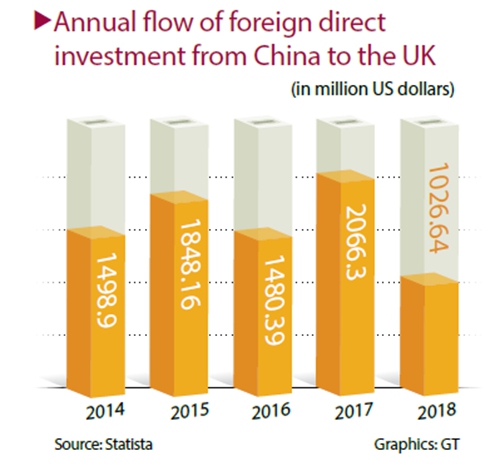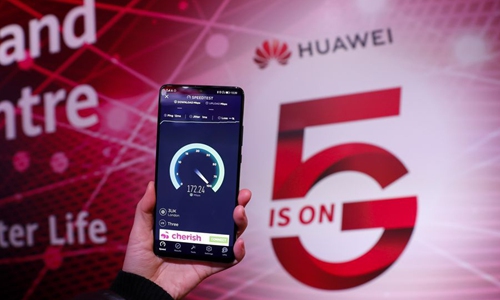UK on edge after Huawei ban angers China
By GT staff reporters Source: Global Times Published: 2020/7/19 20:38:40 Last Updated: 2020/7/20 0:30:36

People walk on a street at Chinatown in London, Britain, on July 4, 2020. Millions of people in England emerged from the COVID-19 lockdown on the so called "Super Saturday" to enjoy coffee shops, bars, restaurants and hair salons for the first time in over three months. (Photo by Ray Tang/Xinhua)
Even though China has not taken any countermeasures, at least publicly, against the UK over its ban on Chinese telecom giant Huawei from its 5G development, many in the UK - from business leaders to scholars - are wary of potential devastating consequences from the move on bilateral ties and on the UK economy, which is already facing what has been described as the worst period in decades.
Such anxiety stems from a strong backlash from China, which vows to take "all necessary" measures. It was illustrated by the widespread attention toward media reports of Chinese short video platform TikTok scrapping a massive plan to build a global headquarters in the UK. Businesses and experts on both sides fear that bilateral businesses ties could see further long-term damage due to deteriorating relations.
Still, in interviews with the Global Times, some Chinese and UK businesses leaders and scholars argue that the UK left some room for potential change in its handling of the Huawei situation and that talks between the two sides to address the dispute are still possible. Some stressed that the UK will eventually realize the importance of positive engagement with China for its economy in the post-Brexit era and change course, though bilateral ties remain under serious pressure on multiple fronts, including Huawei, Hong Kong and the South China Sea.
Deepening anxiety
Uneasiness in the UK over the recent diplomatic row was on vivid display over the weekend after the Sunday Times reported that Beijing-based ByteDance, the parent company of TikTok, had suspended talks with UK officials over building a headquarters in the UK following the UK's Huawei decision.
The Sunday Times report on Sunday, which cited an unnamed source, reported that the Chinese company halted talks over the project that could support 3,000 jobs due to "wider geopolitical contexts," an apparent reference to the Huawei case.
ByteDance did not respond to a request for comment as of press time on Sunday.
Chinese officials have harshly criticized UK's decision and vowed to take "all necessary measures" to protect Chinese businesses. Though Chinese officials have not announced specific measures, they have stressed that the move has seriously undermined mutual trust and Chinese businesses' confidence in the UK market.
In a recent interview with the Times, Chinese Ambassador to the UK Liu Xiaoming hinted that Chinese investments into the UK could be at risk as Chinese companies are wary of Huawei's treatment by the UK.
"In the past 10 years. Chinese investment in the UK increased 20 times…This is a big opportunity for UK," Liu said, noting that with $20 billion Chinese investment, the UK is the largest recipient of Chinese investment in Europe, according to a transcript published by the embassy on Sunday. "I think UK really missed the opportunities."

Annual flow of foreign direct investment from China to the UK.
Beijing's reaction over the UK's decision carries weight. The head of a prominent UK business group said that there was a certain degree of anxiety over bilateral ties and voiced hope that the two sides could "sit down and talk" on the matter. On Friday, the Sunday Times reports Beijing based business leaders were called to a meeting by Chinese government officials where they were warned they could be at risk."Britain is rejecting Europe and rejecting China at the same time, in a situation where the British economy, as we know, historically has been in long term decline," Martin Jacques, a senior fellow at the Department of Politics and International Studies at Cambridge University, told the Global Times on Friday, noting that the British economy is in the "worst period in British economic history since before the industrial revolution…the consequences from rejecting China are going to be extremely serious for Britain."
Apart from the massive Chinese investment, China was the UK's second-largest trading partner after the US in 2018, with two-way trade reaching 68.3 billion pounds ($85.78 billion), according to UK official data. Chinese students also contribute at least 1.7 billion pounds a year to UK universities, according to the UK's National Institute of Economic and Social Research, which warned a trade conflict with China could result in a 90 percent fall in UK trade and a 0.75 percent drop in GDP.

A staff member tests the speed with a Huawei 5G mobile phone at Huawei 5G Innovation and Experience Center in London, Britain, on Jan. 28, 2020. (Xinhua/Han Yan)
Room for change?
"The fact is that [the UK] is facing a very difficult time because of Brexit, the COVID-19 pandemic and so on… we are in a much better place," Chen Fengying, a research fellow at the China Institutes of Contemporary International Relations in Beijing, told the Global Times on Sunday.
However, Chen said that though China must make its "principled stance" over the Huawei case clear, "we need a much more nuanced, long-term strategy toward the UK" rather than getting into an endless tit-for-tat tussle. "I think the UK understands how important China is. It's just that the US got in the way... but things could change over time," she said, noting that the presidential election results in the US could change the dynamic for China and the UK.
In the decision last week, the UK government gave its companies several months until after December to purchase 5G equipment from Huawei and seven years to phase out devices that are already in use.
Jacques thinks there is still a lot of uncertainty attached to this situation including the upcoming presidential election in the US, the cost that the UK needs to pay to replace Huawei equipment and whether the replacement can be successful. "Britain needs to have a relationship with China. It needs China, so China needs to consider the situation as a long game," he said.
Apart from the reported move by TikTok, there were no other changes of plans reported by Chinese businesses in the UK. Although some expressed concerns, certain business deals are moving forward.
Chinese private steel enterprise Jingye Group, which acquired the bankrupt British Steel in March, said that the company's plan to invest 1.2 billion pounds in the UK over the next 10 years is moving forward, the company told the Global Times.
However, the risk of long-term damage to bilateral ties and business deals is increased, not just over Huawei but an increasing number of issues, including Hong Kong and the South China Sea, where the UK appears to be keen to join the US and interfere.
Commenting on the UK's plan to send an aircraft carrier to the South China Sea, Liu warned that it could be "a very dangerous move" and "I don't want to see that the UK would like to gang up with the United States to challenge China's sovereignty and disrupt the stability and tranquility in the region."
RELATED ARTICLES: